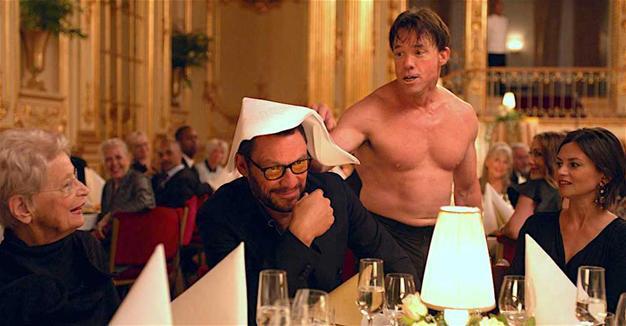Swedish director winner of 70th Cannes Festival
Vecdi Sayar - CANNES

It was not a great festival. Among the 19 features selected for the competition in Cannes, there were quite a number of “mediocre” films, besides some good films. I had three favorites: “Loveless” by Russian director Andrey Zvyagintsev, “Happy End” by Austrian Michael Haneke and “The Square” by Swedish director Ruben Östlund. The jury, presided by Pedro Almodovar, chose to give the Palme d’Or to the Swedish title, leaving Haneke out of the game.
Of course, it would not be fair to give any prize to Haneke, who already has two Golden Palms, as there were also many critics who were not satisfied with the recent Haneke film. But it was not only Haneke forgotten in the awards list; renowned filmmakers François Ozon, Jacques Doillon Sergey Loznitsa, Michel Hazanivicius and Hong Sangsoo were also out.
Östlund was the winner of Un Certain Regard Jury Prize in 2014 for his film “Snow Therapy.” In his new film he criticizes Western society as a totality, with its moral degeneration, disintegration of family values, lack of solidarity between individuals and the fear of the “other.” The refugee crisis as well as the hypocrisy of the arts circles is treated with irony in this film.
Östlund’s creative cinematography brings a second Palme d’Or prize to Sweden, many years after Ingmar Bergman.
A film that was not among my favorites, “120 Beats per Minute” by the French director Robin Campillo, received the second prize, the Grand Prix, most probably due to its emotional approach in depicting the activities of “Act Up,” a militant gay group in Paris in the early 1990s. The love story at the center of the film and the didactic scenes concerning AIDs fighting are carefully interwoven, but as a whole it is unnecessarily long and cinematically uninspiring in my opinion. The film received other prizes from different juries, the FIPRESCI (International Critics) Prize, as well as the special prize dedicated to François Chalais.
The third prize of the festival, the jury award, went to “Loveless” by Andrey Zvyagintsev, which deserved a better prize in my opinion, with its sensitive approach depicting the individual’s need for love and radical critique of today’s Russian society. He had received a prize for Best Script of “Leviathan,” two years ago in Cannes. I have no doubt that we’ll see him receiving the Golden Palm in the near future.
Ladies from USSofia Coppola was given the best director award with her film “The Beguiled,” though she was not present in the awards ceremony and sent a video message. “The Beguiled” is a well-made, well-acted feature with a classical style. This, an adaptation of a novel, was brought to screen years ago by Don Siegel. Coppola has given a feminist touch to the story.
The Jury has created a special award for the 70th Year of the Festival and gave this prize to Nicole Kidman, who acted in two of the competition pics, “The Beguiled” and “The Killing of a Sacred Deer” by the Greek director-writer Yorgos Lathimos.
Kidman certainly deserved such an award with her beautiful performances in both films.
As I wrote earlier, this year’s festival had so many wonderful actresses who deserved the best actress award, but as I imagined the jury gave the award to Diane Kruger, a German-origin American actress who played the main part in Fatih Akın’s “In the Fade.” The best actor award was given to one of my favorite actors, Joaquin Phoenix, with his performance in the British picture “You Were Never Really Here” by Lynne Ramsay. I am sure this was not a difficult decision for the jury to make. Ramsay’s film also shared the best script award with Lanthimos’ “The Killing of the Sacred Deer”.
Golden Camera for a French woman
As it happens every year, first, the films were evaluated by a separate jury, presided by the French actress-director Sandrine Kiberlain. Some 25 films (six from the “Un Certain Regard” section, three from the Special Screenings section, one children’s film, four from Cannes Classics, five from Quenzaine des Realisateurs section and six from the Critics’ Week) were evaluated. The Golden Camera was received by French female director Leonor Seraille for her film “Jeune Femme,” shown in the “Un Certain Regard” section.
A Certain RegardThe main prize for the Un Certain Regard was given to the Iranian director Mohammed Rasoulof, who has been kept in house custody in Tehran for some months because he filmed without permission, for his film “Lerd – A Man of Integrity.” The best actress award was received by Jasmine Trinca for her performance in “Fortunata.” The award for Poetic Cinema was given to Mathieu Almaric for his bio-pic “Barbara,” while the best director award was given to Taylor Sheridan for his feature “Wind River.”
 It was not a great festival. Among the 19 features selected for the competition in Cannes, there were quite a number of “mediocre” films, besides some good films. I had three favorites: “Loveless” by Russian director Andrey Zvyagintsev, “Happy End” by Austrian Michael Haneke and “The Square” by Swedish director Ruben Östlund. The jury, presided by Pedro Almodovar, chose to give the Palme d’Or to the Swedish title, leaving Haneke out of the game.
It was not a great festival. Among the 19 features selected for the competition in Cannes, there were quite a number of “mediocre” films, besides some good films. I had three favorites: “Loveless” by Russian director Andrey Zvyagintsev, “Happy End” by Austrian Michael Haneke and “The Square” by Swedish director Ruben Östlund. The jury, presided by Pedro Almodovar, chose to give the Palme d’Or to the Swedish title, leaving Haneke out of the game.